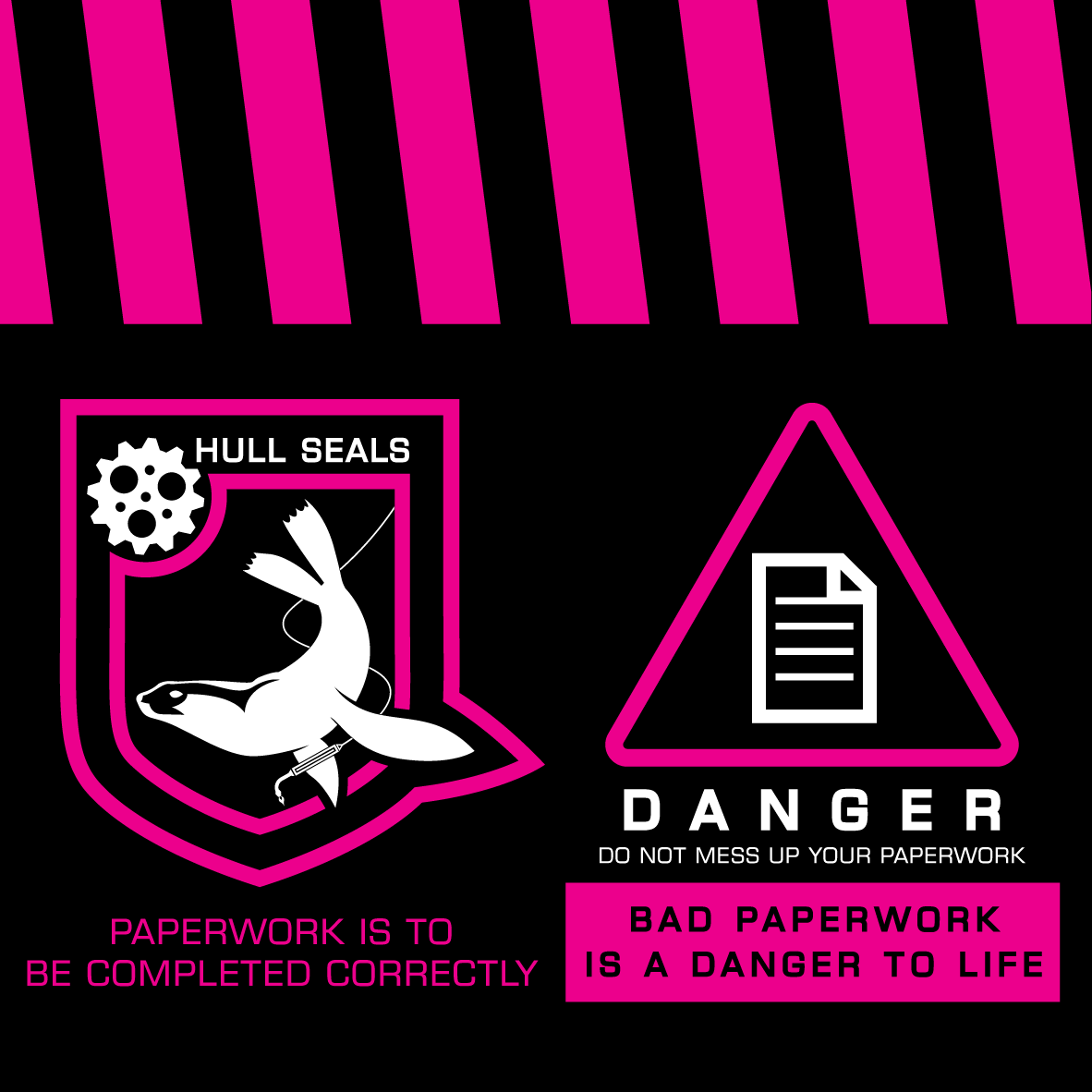Paperwork Filing Guidelines
Primary Seal: Don't forget to do your paperwork!
Words we've all read, often helpfully shouted at us by HalpyBOT. But why, you ask. Why do I have to fill out a form when I'd rather get back to whatever else it was I was doing? No, it's not just to waste your time, paperwork is critical toward making sure the Seals run like a well-oiled machine.
Paperwork is one of the most important duties bestowed upon any Seal after a case is complete. Paperwork is our way of making sure that we know all the details of a case, and most importantly, can recreate what happened if something goes wrong. Every time a case starts, even if it ends up not being technically within our wheelhouse, paperwork should be filed for later reference. Paperwork is reviewed by the PPWK review team, the SOP teams, Dispatchers, and even other Seals to check what happened during a given case, and learn from it. Details included in paperwork may go toward improving our services and procedures, to offer the client the best possible chance of success. Paperwork might also help inform our staff where our wording and advertising can be confusing, and help ensure that we can limit false cases in the future.
So, with that said, how should you file various paperwork situations?
Categories of Paperwork
There are 5 different categories of case closure recognized by the Seals. Successful, Failed, Redirected, False Case, and Other. Here's what they mean:
- Successful: The Client was rescued, using Seal assets and resources. This is what we always want our cases to be, and it means that the mission was accomplished. Use this status even if it's not a technical "Seal" or "Kingfisher" rescue, such as CMDR Extraction, Fuel situations where it was impractical to transfer the client, module repair requests where reboot/repair worked, or something else. Anytime you as a Seal complete the mission, use this. Be sure to specify if it's not a standard seal case in your notes, however!
- Failed: While unfortunate, there are times where we can't save the client. This status is regrettable, and should always serve as a learning opportunity for the Seals, Dispatchers, and Clients. Anytime a mission fails, and the Client was using Seal resources or under Seal direction, use this status. Be sure to state in the notes what went wrong - these cases should have the most details in the notes of any case.
- Redirected: Sometimes, a case just isn't in our wheelhouse. There are dedicated organizations and support networks in place for a large number of different situations, where we are less familiar. The Client's needs should always come first, and ensuring they get the best help possible is the ultimate responsibility of any Seal or Dispatcher. Use this status when a Client is sent to another support network, and explicitly leaves seal services. Examples include redirections to the Fuel Rats, DSSA, Fleet Carriers' Owners Club (FCOC), Cocaine Bears, or other named entities. This includes direct diversion to an established Station.
- False Case: Every once in a while, someone tries to interfere with the mission of the org, or maybe they just didn't need our help after all. This is saved for spam, abuse of systems cases, times a Client never responds to attempts to contact, maliciously or deliberately ignores Seal instructions, or explicitly declines Seal services. Why file these cases? They help us keep tabs on how often people are coming and going from our systems, to inform those with hammers if need be. Note that this is not an alternative to a genuine client mistake, which would still be considered a failed case.
- Other: Finally, Other is a catch-all for anything that didn't get covered above. This includes cases where a client started to use Seal assets, but for some reason the mission is cancelled or incomplete. This includes cases where a Dispatcher comes to perform case intake, but the client died between when the call went out and seals could be rounded up. Anytime it doesn't make sense to file it somewhere else, put it here. Make sure your notes are clear what happened!
Dispatcher and other Seals on the Case
In the Who was Dispatching field you should enter the dispatcher(s) and in the Other Seals on the Case you enter any other Seals that might have been part of the case. This includes Seals who started the game to respond but didn't end up jumping because limpets didn't end up being needed or cause another Seal was closer. It also includes Seals helping Dispatch with the case by for example finding and confirming carriers for CBs.
Simply entering the Seal's name in the fields is not enough, you have to select their name from the list that will pop up so that their name is visible in the field in its own block. Sometimes a Seal won't appear in the list, this may be due to spaces in their name or the fact that thei're using an alt. In those cases simply ask that Seal what their username on the website is.
If there was no separate Dispatcher and Seal and you ended up both jumping as the Seal and dispatching the case you should toggle the Dispatched Case selector to Self-Dispatched. This also includes cases where no Seal was needed and there was only a Dispatcher, for example Reboot Repair cases or Code Blacks.
Notes
In the notes section you should write down any details that seem even remotely important about the case. Some examples:
- Distance travelled and amount of jumps if it was a longer distance case
- How many repair limpets were used and what ship the client was flying
- How they ended up in their predicament
- Any issues while getting to the client, for example
- wrong platform (Legacy vs Live Horizons vs Live Odyssey vs Console)
- wrong game mode (SOLO vs PG vs OPEN)
- wrong system
- issues with friend request
- issues establishing a wing
- issues entering their instance
- inter- and hyperdictions
- Any issues while repairing the client like running out of limpets or desynced hull percentage display
- Any oddities during the case like multiple people in the wing or odd client behaviour
Feel free to also take some screenshots of the case and let us know if you're ok with us posting them on our socials.
Remember, paperwork goes towards your case count, which can be recognized for service awards and badges, as well as new benefits in the future!


No comments to display
No comments to display